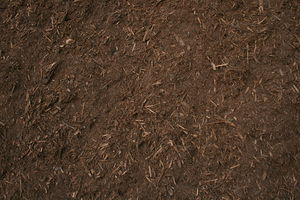Mulch will help to maintain moisture in the soil and reduce the weeds in the garden too.
| Mulch. (Photo credit: Wikipedia) |
If you are using lawn clippings for mulch make sure you haven't used any chemicals on the lawn prior to cutting, that could have a detrimental affect on your plants. If you leave the clippings to rot first this will often reduce any side effects that these chemicals might have on your plants.
Lawn clippings can also generate a lot of heat so spread them around lightly in thin layers and don't smother your plants with it - they are a green form of compost materials, and they do heat up a lot while decomposing.
There are many different things that can be used for mulch, from lawn clippings and plant cuttings to straw, hay and bark.
All those autumn leaves that are blowing around your property can make good mulch but they really need to be left to rot before being used, as they can be too acidic if used too soon.
If in doubt with anything you are using for mulch, leave it to rot first, or compost it, and you can be sure it will be better for your garden.


No comments:
Post a Comment